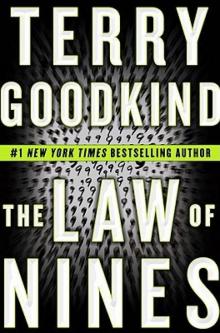- Home
- Terry Goodkind
The Law of Nines Page 2
The Law of Nines Read online
Page 2
“I’m headed there now, as a matter of fact. If you’d like to see some of my work, the gallery is down a little ways from Regent Jewelry . . .”
His voice trailed off. He suddenly felt a little foolish at his presumption. He imagined that a woman like her would be interested only in the exclusive jewelry store or the boutiques. Since she wasn’t wearing any jewelry he wasn’t sure why he assumed such a thing, but he guessed he feared that she probably wasn’t interested in art—or his art, anyway.
“I’d like to see your work.”
He looked over at her. “Really?”
She nodded as she pulled a wavy lock of blond hair back off her face.
Alex felt his cell phone vibrate silently in his pocket, letting him know that another text message was being delivered. He sighed inwardly as he cut a straight line across the nearly empty parking lot. It was only midmorning; most people didn’t arrive until closer to lunchtime. A few dozen expensive cars, glittering in subdued shades of silvers, reds, and ambers, were parked in a cluster around the main entrance.
Message delivered, his phone finally stopped vibrating. Bethany, he was sure, was responsible. He hadn’t even known that his phone was capable of receiving text messages until after he’d met her several weeks back. After he’d gone out with her a second time she had started sending him text messages. They were painfully petty. He rarely read them anymore. She usually asked things like if he was thinking of her. He hardly even knew her. What was he supposed to say? That she hadn’t entered his mind?
He ignored the phone as he opened the center-pivot glass door for the woman. It wasn’t the kind of shopping area that lent itself to the financially timid. She glided through the doorway with the kind of grace and confidence born of being used to such places.
Before the door closed Alex glanced back across the lot, between the linden trees lining the edge of the street, to the white truck still sitting at the curb in front of the police car. He couldn’t make out the men inside.
As they passed into the hushed, grand seclusion inside, he was a little surprised to see the woman only glance at the alluring glimmer of Regent Jewelry. As they strolled through the halls, her cool gaze took in each exclusive shop in equal measure. The dress shop, Alex knew, didn’t sell anything, except maybe a scarf, for less than four figures. The woman scanned the outfits in the window with no more interest than she took in the shoes in the next store window, or the purses in the next.
Alex saw other women cast appraising glances her way. She looked at the other women, but in an altogether different manner. They were evaluating her socially. She was assessing them . . . spatially, checking their distance before briefly taking in their faces as if to see whether she recognized them.
“Down here, around the corner,” Alex said, drawing her attention.
When he spoke to her she met his gaze with a focused involvement that was respectful and interested. He couldn’t imagine this woman ever sending him a text message.
She allowed him to direct her around the curve of the corridor decorated with sweeping inlaid metal lines in the speckled pink granite floor. Cast-stone arches stood at a branch of halls. The one Alex took led into a sunlit corridor. Skylights overhead let streamers of light play across the planters overflowing with philodendron and an assortment of salmon-colored hibiscus.
Alex drew them to a halt before the gallery window surrounded with ornate gold molding. The molding, meant to resemble a picture frame, showcased some of the more expensive and sought-after works just inside.
Alex gestured through the window. “This is the place.”
A twitch of disapproval ghosted across her features. “Do you mean to say that you . . . painted this?”
She was looking at the large piece displayed in the center of the crowded floor just inside the window. It had been done by R. C. Dillion, a midwestern artist who was becoming a national figure. It was said of him that R. C. Dillion was at the forefront of a new reality in art.
“No, not that one,” Alex said. He leaned closer as he pointed beyond the nonobjective works crowding the window to a small landscape displayed on an easel near the back. “That’s one of mine back there. The mountain scene with the pines in the foreground to the left.”
Alex was relieved to see that Mr. Martin, the gallery owner, had at least put a small spotlight on the painting rather than setting it on the floor, leaned against a wall, as he sometimes did. The small light made the sunlit clearing, within the hushed cathedral of trees, come to life.
“See the one I mean?” he asked as he glanced over at her.
Her mouth opened a little in surprise. “Alexander, it’s beautiful.”
Alex froze.
He knew that he hadn’t yet mentioned his name. He knew because he had been waiting for the right time to do so without sounding like he was coming on to her.
It finally dawned on him that she’d probably been to Regent Center before and she must have visited the gallery. That only made sense; wealthy women knew the gallery, after all—they just didn’t tend to take note of his work. Alex’s bio, with his photo, was posted beside his paintings. He signed his name in the longer form—Alexander—and that was also the way it was shown on his biography. She must have known his name from that.
She looked up to study his face intently. “Why did you paint that?”
Alex shrugged. “I like the woods.”
Her eyes began to look a little more liquid, as if what she saw in that painting had some hallowed meaning to her. “No, I mean why did you paint that particular place in the woods?”
“I don’t know. I just made it up from my imagination.”
She looked like she wanted to say something, but she instead turned back to stare through the window, looking too taken for words.
Alex was about to ask why that particular scene seemed to matter so much to her when his cell phone rang. He didn’t want to answer it, but the woman was staring through the window, absorbed in gazing at his painting, so he turned aside and opened the phone.
“Hello?”
“Alex, it’s me,” Bethany said.
“Uh, hi,” he said quietly as he hunched over the phone.
“Didn’t you get my text messages?”
“I’m sorry, I haven’t read any of them today. I told you, you should just call if you have something to say.”
“You’re so silly, Alex,” she said in a lilting voice that he found grating. “Who doesn’t use text? Don’t be so ancient. Everyone does it.”
“I don’t. So, what is it?”
“Well, if you would have read the messages that I took the time to send you, you’d know. I made plans to take you out tonight and get you good and drunk for your birthday.”
She sounded miffed. Alex didn’t really care. Nor did he care to get drunk or do anything else to celebrate such a somber day. He was even more annoyed at her presumption.
Bethany was beginning to assume that there was far more between them than was actually there. He’d taken her out a couple of times—enough to find out that they didn’t really have anything in common. The dates had been relatively short and unremarkable. He didn’t know what she saw in him, anyway. They just didn’t click. She liked expensive things and Alex wasn’t wealthy. She liked to party and Alex didn’t.
And, his art bored her.
“I’m sorry, Bethany, but let me read your messages and I’ll get back to you.”
“Well—”
He flipped the cover closed and turned back to the woman. She was watching him again in that way that he couldn’t quite figure out.
“Sorry.” He briefly held up the phone in explanation before stuffing it back into his pocket.
She glanced back over her shoulder to his painting. “Me too. My time is up,” she said as she turned away from the window to face him. “I have to go for now.”
“Really? Well can I at least—”
The phone rang again. He wished he had shut it off.
The
woman’s small smile returned, curving her lips in a way that was bewitching. She arched an eyebrow as she gestured to his pocket. “You’d better talk to her or she’ll be even more angry with you.”
“I don’t really care.”
But Alex knew that Bethany wasn’t going to give up, so he finally pulled the ringing phone from his pocket. He held a finger up toward the woman. “Give me just a moment, please?”
The woman took one last look through the window and then turned back to him, considering. The way her expression turned serious made him pause in place.
The phone stopped ringing as it went to message.
“Be careful of mirrors,” she said at last into the quiet. “They can watch you through mirrors.”
Goose bumps tingled up Alex’s arms.
He almost dropped the phone when it rang again.
“What?”
She only stared at him with that bottomless gaze.
“Please,” he said, “hold on for just a second?”
She melted back into the shadows between the shops, as if to give him his privacy on the phone.
He turned away and flipped open the phone. “What?”
“Alex, don’t you ever—”
“Look, I’m right in the middle of something important. I’ll call you back.”
He flipped the phone closed without waiting for Bethany to agree and turned back to where the woman waited in the shadowy nook.
She was gone. Simply . . . gone.
3.
ALEX CRANED HIS NECK, K , looking around at the well-dressed shoppers strolling the hushed hall. Most were women. He didn’t see the one he was looking for.
How could she have vanished so quickly?
He trotted to the archway, looking back toward the massive Regent Jewelry, but he didn’t see her there, either. It was not simply startling that she had left so quickly, it was maddening. He had wanted to get her name, at least.
He hadn’t expected that he would so abruptly run out of time. He had missed his chance.
But maybe not. She had said that she had to go “for now.”
He wondered what she’d meant by that.
He let out a long sigh. Probably nothing. She was probably only being polite. She’d probably wanted to be rid of him the same way he’d wanted to be rid of Bethany.
Somehow, though, it didn’t seem like that was it. Something else was going on, he just didn’t know what.
In the hallway filled with the whisper of footsteps and soft conversation sprinkled with light laughter it began to feel like he had just imagined the whole thing.
That was a thought he truly didn’t want to have, especially not on this day of all days.
The Regent Center suddenly felt very empty and very lonely. His mood, which had only started to lift, sank back down.
He pressed his lips tightly together in agitation at Bethany and her mindless text messages and phone calls. They were never important, but they had just interrupted something that was.
Letting out another sigh of disappointment, he finally made his way back through the clusters of women out for a bit of shopping. He scanned the faces, absently looking for the one who had vanished. He eventually ended up back at the gallery without seeing her, somehow having known that he wouldn’t find her.
Seized by a sudden idea, he peered in the window, wondering if maybe the woman had actually gone inside to look at his painting while he was answering the phone. Maybe he simply hadn’t noticed. Maybe she’d just wanted to see it up close. After all, she had seemed to be taken by the painting.
Peering in the gallery window, he didn’t see the woman, but Mr. Martin saw him and flashed a polite smile.
Hand-wrought Tibetan bells hung by a knotted prayer cord on the door into the small shop rang their simple, familiar chime as Alex closed the door on his way in. He only glanced at the featured pieces on his way past. He had trouble calling them “works.”
The slender Mr. Martin, dressed in a dark double-breasted suit, had a habit of nesting his hands one atop the other. He usually reversed the order several times before their arrangement suited him. A bright pink tie flared from his collar just below his prominent Adam’s apple.
“Mr. Martin, how are things today? I just stopped by to see if—”
“Sorry, Alex. None of your pieces have sold since the one last month.”
Alex drew his lower lip through his teeth. “I see.”
He guessed he would have to walk whenever possible until he could get his truck fixed. Fortunately the places he needed to get to were close enough, now that shops and stores had opened in the last year. His grandfather’s house had always been within walking distance. Ben, in fact, was probably waiting for Alex to stop by.
Mr. Martin drew on his thin smile again as he leaned in patiently. “If you would let me guide you, Alex, I know that I could make a name for you—along with a lot of money.” He lifted a hand, waggling his lithesome fingers toward the painting displayed in the center view of the window. “R. C. Dillion is making himself a fortune with his striking works. His all too obvious anguish and distress over the ruination of the planet is not just heartbreaking, but sought after. Collectors want an artist who can bring such meaningful emotion to the canvas. It gives them a certain sense of pride to let others see the important concerns they so obviously share with the artist.”
Alex glanced at the angry slashes of red paint. It certainly did represent ruin. “I hadn’t been aware that that was what R. C. Dillion was trying to portray.”
“Of course not, Alex, because you won’t take my valuable advice and open your mind to the essence of other realities, as important artists do.”
“I like painting the essence of our own reality,” Alex said as civilly as he could. “If you think that the buyers are so interested in the planet, why don’t you show them my paintings of it?”
Mr. Martin smiled in that tolerant way he had. “I do, Alex, I do, but they’re more interested in true artistic vision than . . . than what you do. You show nothing of the rapacious nature of mankind. Your work is charming, but not important. It’s hardly groundbreaking.”
“I see.”
Had he not been so dejected, Alex likely would have gotten angry. Through his gloom, though, the slight didn’t lift his hackles. Instead it only served to weigh him down further.
“But I assure you, Alex, I do display your work as favorably as possible, and we have had some minor success with it.” The smile became fawning as Mr. Martin remembered that occasionally one of Alex’s paintings did sell, and that his gallery took a forty percent commission. “I’m hoping for better sales of your work when the holidays come around.”
Alex nodded. He knew that arguing his beliefs about art was pointless. It only mattered if he could sell his work. He had success with a few people who appreciated his landscapes. There were still people who wanted to see works like his, paintings that crystallized the beauty of a scene. There were people who appreciated a vision that uplifted them.
The woman, after all, had liked it, and she easily appeared more intelligent than any of Mr. Martin’s collectors. She knew what she liked and wasn’t afraid to say so. Most of Mr. Martin’s clients depended on him to tell them what they should like. They were willing to pay handsomely for such erudite guidance.
Still, Alex needed to eat.
“Thanks, Mr. Martin. I’ll check back—”
“Don’t worry, Alex, I’ll call you right away if one of your pieces sells, but please think about what I said.”
Alex nodded politely before he headed for the door. He knew that no matter how hungry he got he would never throw paint at a canvas and pretend it was art.
It was turning out to be an even more depressing birthday than he had expected. His grandfather might cheer him up, though.
He paused, then turned back. “Mr. Martin, I need to take this one with me.”
A frown creased Mr. Martin’s brow as he watched Alex lift the small painting from the easel.
“Take it? But why?”
Taking one painting left the gallery with six of his pieces to sell. It wasn’t like there was a run on his work.
“It’s for a gift—for someone who values it.”
A cunning grin overcame Mr. Martin. “Clever, Alex. Sometimes a small gift can be the seed that starts an expensive collection.”
Alex forced a brief smile and nodded as he tucked the painting under his arm.
He didn’t know if he would ever see the woman again. He realized that it was rather silly to think that he would.
But if he did, he wanted to give her the little painting. He wanted to see her smile again, and if it took only a painting then it would be more than worth it.
4.
I THINK THE MIRRORS ARE WATCHING ME,” Alex said as he stared off into distant thoughts. Ben shot him a look back over his shoulder. “Mirrors tend to do that.”
“No, I mean it, Ben. Lately it feels like they’re watching me.”
“You mean you see yourself watching you.”
“No.” He finally focused his gaze on his grandfather. “I mean it feels like someone else is watching me through mirrors.”
Ben gave him a look. “Someone else.”
“Yes.”
Alex wondered how she knew.
He was beginning to seriously doubt that she had been real. Was it possible that he could have imagined such a thing?
Was it beginning to happen to him, too? He fought back a ripple of panic at the thought.
“Don’t let your imagination get the best of you, Alexander,” his grandfather said, turning back to the work at his bench.
Alex’s gaze again wandered off into gloomy memories.
“Do you think that I’ll end up crazy, too?” he murmured after a time.
In the dead silence he turned to see that his grandfather had halted his tinkering at his timeworn workbench to stare up with an unsettling look, a kind of hard glare that could have been born only in dark and angry thoughts.
Alex found such a look frightening in that it was so unlike his grandfather, or at least the man Alex knew.
A wrinkled smile finally banished the forbidding look. “No, Alex,” the old man said in a gentle voice, “I don’t think that at all. Why would you come up with such depressing thoughts on your birthday?”

 Confessor
Confessor Wizard's First Rule
Wizard's First Rule Shroud of Eternity
Shroud of Eternity Debt of Bones
Debt of Bones Nest
Nest Stone of Tears
Stone of Tears The Omen Machine
The Omen Machine The First Confessor
The First Confessor Trouble's Child
Trouble's Child Faith of the Fallen
Faith of the Fallen Chainfire
Chainfire Naked Empire
Naked Empire Temple of the Winds
Temple of the Winds Severed Souls
Severed Souls The Law of Nines
The Law of Nines Blood of the Fold
Blood of the Fold Warheart: Sword of Truth: The Conclusion
Warheart: Sword of Truth: The Conclusion The Sky People
The Sky People Heart of Black Ice (Sister of Darkness: The Nicci Chronicles Book 4)
Heart of Black Ice (Sister of Darkness: The Nicci Chronicles Book 4) Hateful Things
Hateful Things The Scribbly Man
The Scribbly Man The Pillars of Creation
The Pillars of Creation Soul of the Fire
Soul of the Fire Wasteland
Wasteland Heart of Black Ice
Heart of Black Ice Crazy Wanda
Crazy Wanda Death's Mistress
Death's Mistress Siege of Stone
Siege of Stone The Third Kingdom
The Third Kingdom Into Darkness
Into Darkness The Girl in the Moon
The Girl in the Moon Witch's Oath
Witch's Oath Temple of the Winds tsot-4
Temple of the Winds tsot-4 Naked Empire tsot-8
Naked Empire tsot-8 Wizard's First Rule tsot-1
Wizard's First Rule tsot-1 The First Confessor (The Legend of Magda Searus)
The First Confessor (The Legend of Magda Searus)![[Sword of Truth 9] - Chainfire Read online](http://i1.bookreadfree.com/i1/03/27/sword_of_truth_9_-_chainfire_preview.jpg) [Sword of Truth 9] - Chainfire
[Sword of Truth 9] - Chainfire Chainfire: Chainfire Trilogy Part 1 tsot-9
Chainfire: Chainfire Trilogy Part 1 tsot-9 Soul of the Fire tsot-5
Soul of the Fire tsot-5 Pillars of Creation
Pillars of Creation Faith of the Fallen tsot-6
Faith of the Fallen tsot-6 The Pillars of Creation tsot-7
The Pillars of Creation tsot-7 Blood of the Fold tsot-3
Blood of the Fold tsot-3 Warheart
Warheart Stone of Tears tsot-2
Stone of Tears tsot-2 Death's Mistress--Sister of Darkness
Death's Mistress--Sister of Darkness Phantom: Chainfire Trilogy Part 2 tsot-10
Phantom: Chainfire Trilogy Part 2 tsot-10 Confessor: Chainfire Trilogy Part 3 tsot-11
Confessor: Chainfire Trilogy Part 3 tsot-11